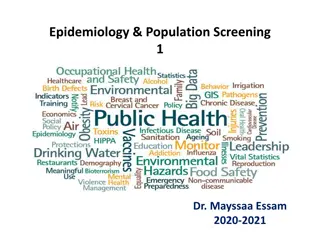
Epidemiology: Study of Disease in Populations and Its Applications
Epidemiology is the study of disease occurrence in populations, including human and animal populations. It involves investigating disease origins, control, natural history, and assessing economic impacts. Different types of epidemiological investigations and components are explored, along with insights into health, disease factors, and external influences.
Download Presentation

Please find below an Image/Link to download the presentation.
The content on the website is provided AS IS for your information and personal use only. It may not be sold, licensed, or shared on other websites without obtaining consent from the author. If you encounter any issues during the download, it is possible that the publisher has removed the file from their server.
You are allowed to download the files provided on this website for personal or commercial use, subject to the condition that they are used lawfully. All files are the property of their respective owners.
The content on the website is provided AS IS for your information and personal use only. It may not be sold, licensed, or shared on other websites without obtaining consent from the author.
E N D
Presentation Transcript
EPIDEMIOLOGY nci Ba ak M tak, PhD Ankara University Faculty of Veterinary Medicine
Definition of Epidemiology The study of disease in populations and of factors that determine its occurence. The term as Epidemiology is used for the outbreaks of disease in human populations Epidemiology ralated to studies of human populations and epidemics epidemics Epizootiology Epizootiology ralated to studies of animal populations and epizootics the outbreaks of disease in animal populations epizootics is used for
The uses of Epidemiology 1. determination of the origin of a disease whose cause is known; 2. investigation and control of a disease whose cause is either unknown or poorly understood; 3. acquisition of information on the ecology and natural history of a disease; 4. planning, monitoring and assessment of disease control programmes; 5. assessment of the economic and other social effects of a disease, and analysis of the costs and benefits of alternative control programmes.
Types of Epidemiological Investigation 1. Descriptive epidemiology 2. Analytical epidemiology 3. Experimental epidemiology 4. Theoretical epidemiology
Components of Epidemiology The first stage in any investigation is the COLLECTION OF RELEVANT DATA. Investigations can be either qualitative qualitative or quantitative approaches approaches. . Qualitative Qualitative investigations investigations: : The natural history of disease, Causal hypothesis testing Quantitative Quantitative investigations investigations: : Surveys Monitoring Surveillance Modelling Evaluation of disease control COLLECTION OF RELEVANT DATA. quantitative or a a combination combination of of these two these two
HEALTH and DISEASE Health; a state of complete physical, mental and social well-being and not merely the absence of disease or infirmity. (WHO, 2014) Disease; is the separation of the body from health or abnormal clinical symptoms. DISEASE FACTORS DISEASE FACTORS External factors Internal factors
EXTERNAL FACTORS Physical factors (rays, heat, electricity etc.) Chemical agents (chemical substances, gases, poisons, nurtition etc.) Mechanical factors (hit, impact, plunge, asphyxia etc. ) Biological factors Arthropods Helminths Protozoan Fungi and Yeast Bacteria Virus Prion
INTERNAL FACTORS Hormonal Metabolic Genetic Reference: Veterinary Epidemiology, 4ed. Michael Thrusfield with Robert Christley, Brown H, Diggle PJ, French N, Howe K, Kelly L, O Connor A, Sargeant J, Wood H.






















